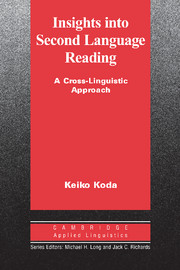2 - Theoretical underpinnings
Published online by Cambridge University Press: 05 October 2012
Summary
To accomplish the book's major intent – analyzing accepted L1 reading concepts from L2 points of view – it would be advantageous to describe the theoretical foundations of the issues examined. A sensible beginning would be transfer theory, because cross-linguistic interactions are central to L2 processing as an important basis for examining reading behavior variations. As the basic cognitive mechanism explaining skills acquisition and performance improvement, a consideration of the connectionist theorem affords a useful groundwork. What is commonly referred to as the component skills approach constitutes a means of contrasting the competency components and their relative impacts on L2 reading efficiency. Finally, three additional formulations, each of which helps conceptualize L2 reading ability differences, are described.
Cross-language reading skills transfer
Language transfer has long been a central concern among L2 researchers. As an outgrowth of the contrastive analysis (CA) hypothesis, transfer concepts were widely endorsed in the 1950s and 1960s. Their basic hypothesis, a derivative of behaviorism, contends that the principal barriers to L2 learning stem from interference factors spawned by previous language-learning experience. In more recent contentions, however, language learning is viewed as continuous hypothesis formation and verification, based on available linguistic input. This view makes completely different assumptions about the effects of previous language-learning experience – namely, providing facilitation by creating an essential basis for establishing an additional linguistic system. The current shifts in transfer research have materialized during this compelling transition in language-learning theories.
- Type
- Chapter
- Information
- Insights into Second Language ReadingA Cross-Linguistic Approach, pp. 13 - 26Publisher: Cambridge University PressPrint publication year: 2005
- 1
- Cited by



